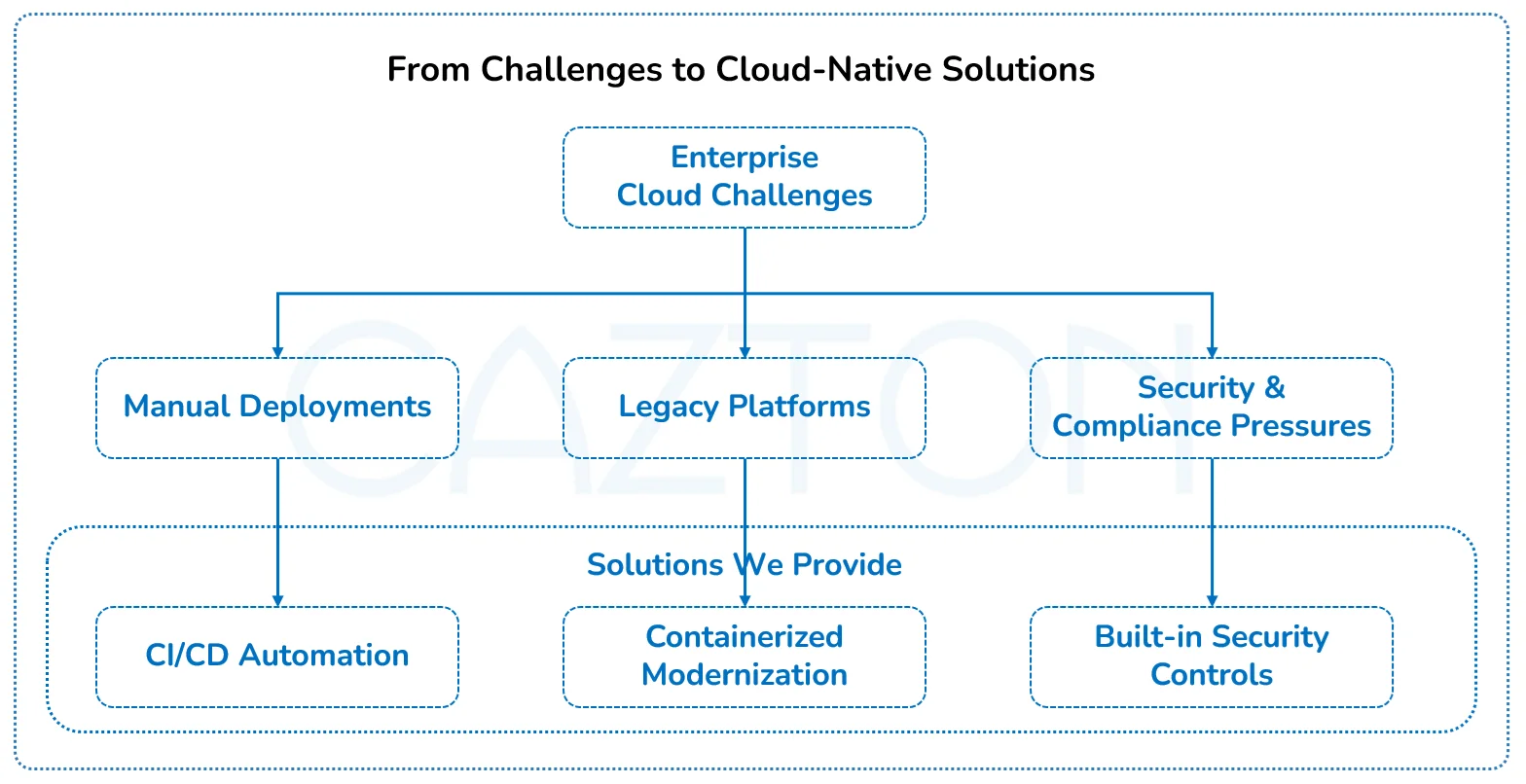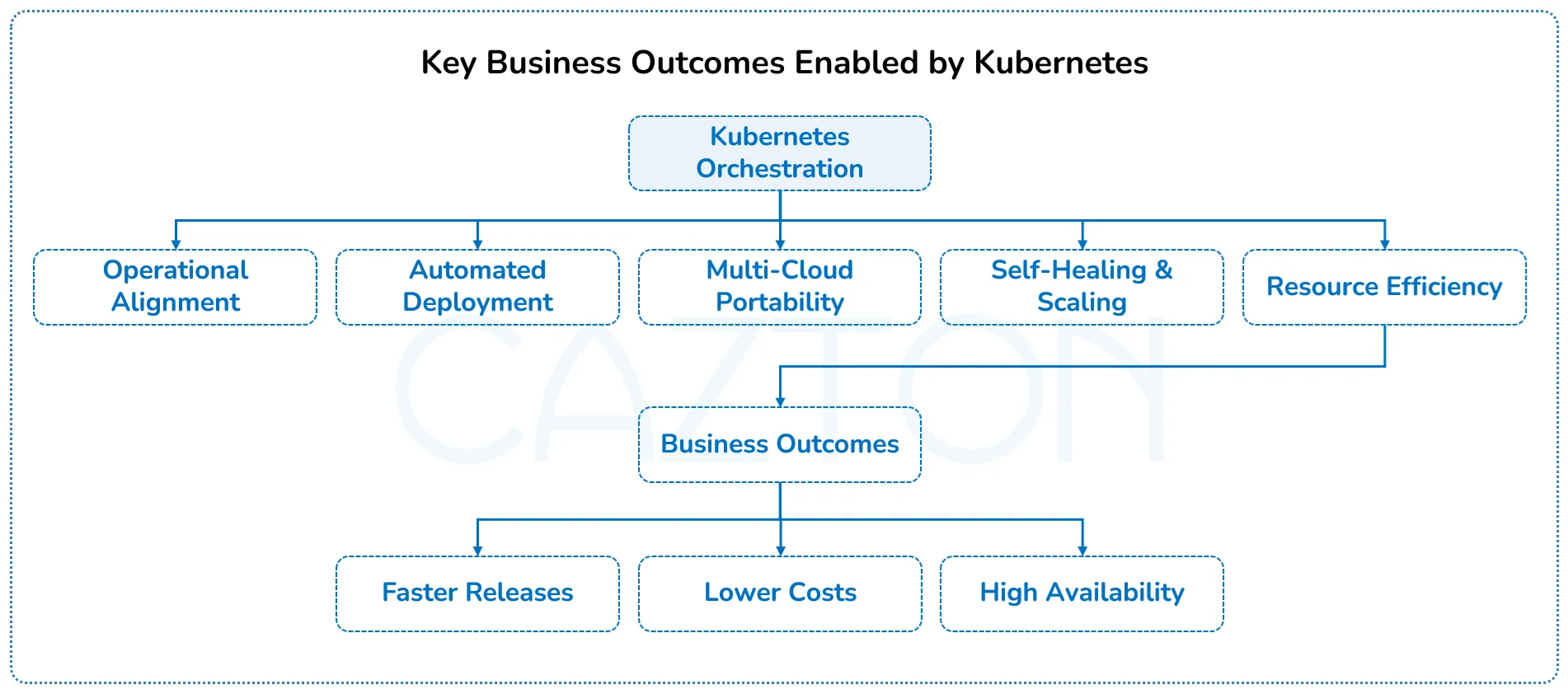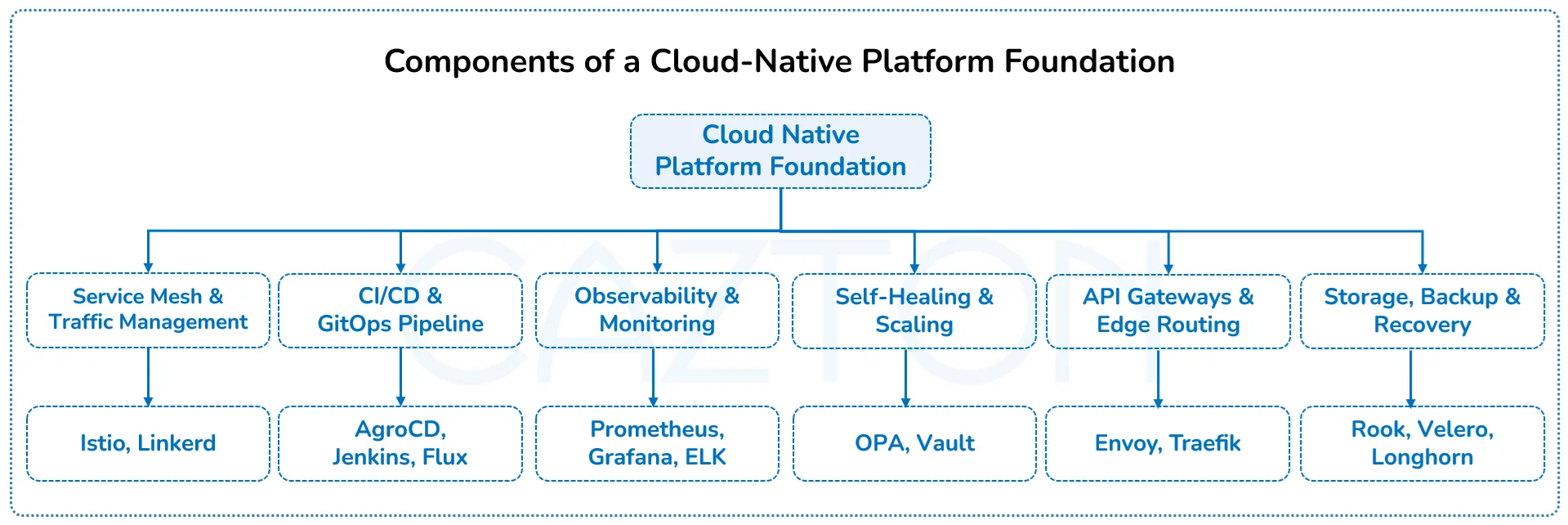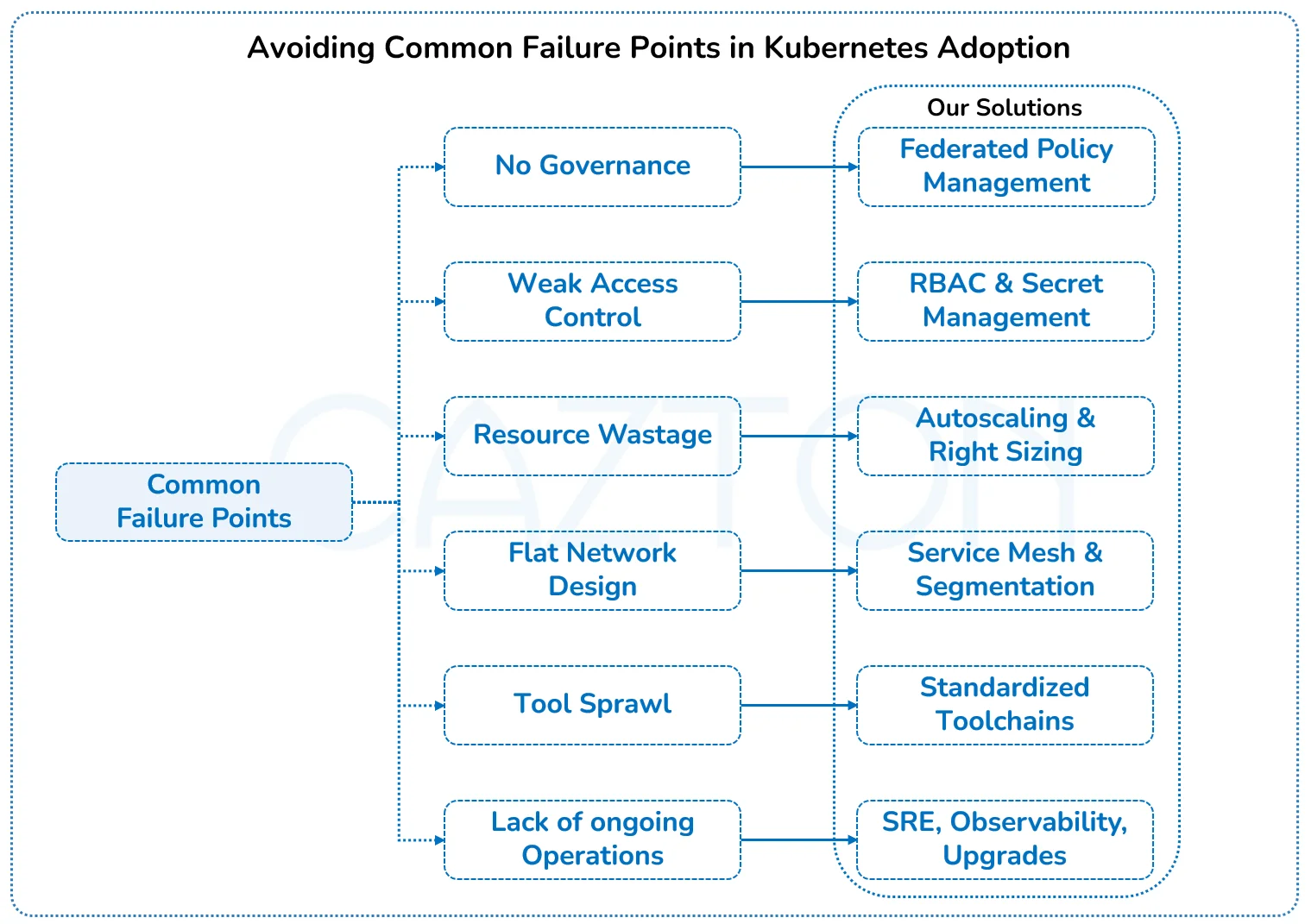Kubernetes Consulting
- Why Kubernetes matters to your business: Kubernetes helps your applications scale reliably, stay resilient, and run across any cloud, giving your teams the agility to adapt quickly to business needs.
- Get it right from the start: Many Kubernetes initiatives struggle due to poor planning or misalignment. Our experts guide your teams through a structured rollout that ensures reliability, security, and measurable impact from day one.
- Proven impact across industries: From finance and healthcare to retail and manufacturing, we deliver Kubernetes solutions that align with industry-specific requirements, regulatory standards, and operational priorities.
- Ensure performance and cost efficiency: With intelligent resource management, real-time monitoring, and scaling strategies, we help you get the most value from your infrastructure investment without sacrificing performance.
- Avoid lock-in with true flexibility: We help you deploy Kubernetes across Azure, AWS, Google Cloud, and on-premises, giving you the freedom to move and scale your workloads based on business priorities, not vendor constraints.
- Build security into the foundation: Security is not an afterthought. Our approach integrates access control, network segmentation, and real-time monitoring from the start to protect your data and applications.
- Top clients: We build tech solutions for top Fortune 500, large, mid-size and startup companies with Big Data, Cloud, and AI development, deployment (MLOps), consulting, recruiting and hands-on training services. Our clients include Microsoft, Broadcom, Thomson Reuters, Bank of America, Macquarie, Dell and more.
Modern enterprises face an unprecedented challenge: scaling applications rapidly while maintaining security, reliability, and cost efficiency. Traditional infrastructure approaches create bottlenecks that limit your organization's ability to respond to market demands and customer expectations.
Kubernetes emerges as the solution that enables true digital transformation. This container orchestration platform allows your applications to scale automatically, deploy consistently across multiple environments, and adapt to changing business requirements. However, achieving successful Kubernetes adoption at the enterprise level remains a complex challenge.
We turn Kubernetes from a complex technology challenge into a strategic advantage through deep technical expertise and business insight. Our approach transforms Kubernetes from a complex technology challenge into a competitive advantage that drives measurable business outcomes for your organization.
Address Your Cloud and Infrastructure Challenges
Are manual deployments, complex application releases, or limited observability slowing your transformation efforts? These issues don’t just delay releases; they erode agility. We help enterprises implement fully automated CI/CD pipelines and robust monitoring frameworks that eliminate deployment bottlenecks and reduce human error.
Do infrastructure silos or legacy platforms prevent you from leveraging Kubernetes to its full potential? Whether you’re struggling with inconsistent environments or cross-cloud limitations, our experts modernize your infrastructure with containerized architectures that enable portability, flexibility, and performance across Azure, AWS, GCP, and on-prem systems.

Are your DevOps and operations teams under pressure to deliver faster while ensuring security and compliance? We embed security-first practices into your delivery pipeline, implement role-based access controls, and ensure regulatory compliance is met without slowing down releases. Our solutions support your teams with the tools, training, and automation they need to scale confidently.
Digital transformation is no longer optional. Kubernetes and containerization are reshaping how enterprises achieve agility, scale, and speed. We help organizations adopt these technologies with confidence, building the foundation for AI, automation, and modern operations. We partner with you every step of the way, from strategy to execution, to turn complex challenges into a modern, scalable platform that drives long-term efficiency, innovation, and measurable business value.
Your Guide to Container Orchestration Success
Kubernetes orchestrates containerized applications across your infrastructure, automatically managing deployment, scaling, and operations. Think of it as an intelligent conductor that ensures your applications run smoothly regardless of underlying infrastructure complexity.
The platform consists of three core components that work together seamlessly:
- The control plane manages cluster decisions and maintains desired application states.
- Worker nodes execute your applications and handle traffic routing.
- The container runtime ensures applications run consistently across different environments.
This architecture creates unprecedented flexibility for your business. Applications can scale up during peak demand periods and scale down during quiet times, optimizing resource utilization and costs. When hardware fails, Kubernetes automatically redistributes workloads to healthy systems, ensuring business continuity.
Real-world implementations demonstrate significant business impact. Organizations typically achieve 50% faster deployment cycles, 30% reduction in infrastructure costs, and 99.9% application uptime. Our expertise ensures your implementation delivers these results while maintaining enterprise-grade security and compliance standards.
What Kubernetes Does for Your Business
Kubernetes is the leading container orchestration platform for automating deployment, management, and scaling of applications. Instead of managing infrastructure manually or facing vendor lock-in, your teams can define business and operational objectives like performance, SLAs, or compliance, and Kubernetes dynamically orchestrates resources to meet them.
We help enterprises adopt Kubernetes not just as a platform, but as a strategic business enabler. We work closely with your teams to design scalable, secure, and future-ready Kubernetes environments that align with your specific goals, whether you're building AI-enabled apps, migrating legacy systems, or scaling globally.

Our architecture approach is built around these enterprise-grade foundations:
- Reliable core: Kubernetes’ control plane, including the API server, controllers, and scheduler, forms the backbone of automated scaling, failover, and workload orchestration. We design and implement this foundation to ensure high availability, performance, and resilience tailored to your business and technical requirements.
- Ecosystem extension: Helm, Operators, service mesh, and other tools expand Kubernetes' capabilities to support faster integration, automation, and operational efficiency. We assess, implement, and manage the most effective tools for your environment, helping you simplify DevOps workflows and accelerate platform adoption.
- Enterprise-grade tooling: Security, observability, CI/CD, and compliance must be integral to the platform, not added later. We build complete toolchains with policy-driven controls, automated audits, live dashboards, and detailed playbooks, equipping your teams to manage and scale Kubernetes with confidence.
With Cazton as your partner, you can achieve seamless cloud migration, edge deployments, regulated workloads, or multi-region SaaS expansion; faster and with reduced risk. Our client portfolio spans organizations of all sizes and sectors, each achieving measurable business outcomes through strategic Kubernetes transformation.
How Leading Teams Succeed with Kubernetes
- Multi-cloud and hybrid orchestration: Leading teams use Kubernetes to deploy workloads seamlessly across cloud, on-prem, and edge environments. A unified control plane and declarative configs make multi-cloud orchestration reliable and portable. We help design and manage these environments to ensure consistent operations and governance across all locations.
- Autoscaling and self-healing: Built-in autoscaling and health checks allow applications to respond to changing demand and recover from failures without manual intervention. This reduces downtime and ensures steady performance. We configure and optimize these features to match your traffic patterns and service level objectives.
- Policy-as-code governance: Policy-as-code frameworks let organizations define security, compliance, and operational rules within Kubernetes itself. These rules are embedded into pipelines for consistent, automated enforcement. We guide implementation of policy tools that align with your internal controls and audit requirements.
- Zero trust, secure networking: Kubernetes supports identity-based access, network segmentation, and service mesh integration to build zero trust environments. We help implement these capabilities securely and directly into your Kubernetes environment. Security policies are enforced dynamically without slowing development or operations.
- Treat infrastructure like software: Declarative configurations, GitOps workflows, and Helm charts allow teams to manage infrastructure just like application code. This approach improves traceability, testing, and version control. We assist in rolling out infrastructure-as-code practices that integrate with your development lifecycle.
- Gain real-time operational insight: Fine-grained metrics and logs from Kubernetes components give teams deep visibility into application health, latency, and resource consumption. When paired with observability tools, this supports fast root-cause analysis. We help build tailored dashboards and alerting systems to support proactive operations.
- Extend the platform to fit your needs: Kubernetes allows for custom resources, Operators, and plugins that adapt to unique enterprise workflows. Teams can automate processes or integrate internal systems seamlessly. We develop and maintain extensions that ensure the platform grows with your business.
- Deploy predictability across environments: Declarative manifests and environment abstraction ensure consistent application behavior from development through production. This reduces errors, improves test accuracy, and accelerates release cycles. We create reusable deployment templates that align with your QA and release practices.
- Integrate without disruption: Kubernetes can coexist with legacy systems through APIs, DNS, and service discovery patterns, enabling gradual modernization. Teams can modernize at their own pace while minimizing risks. We assist in connecting your legacy stack with Kubernetes for a smooth transition.
- Build capability within your teams: Successful Kubernetes adoption depends on how well your teams understand and manage the platform. The shift requires new skills and processes, from automation to platform ownership. We deliver training, documentation, and hands-on support to help your teams operate independently and effectively.
Building Your Cloud-Native Foundation for the Future
Kubernetes serves as the cornerstone of modern cloud-native architecture, enabling organizations to build resilient, scalable platforms that span cloud and edge environments. At Cazton, we help you unlock Kubernetes' full potential by implementing a comprehensive ecosystem of tools and practices that transform how you develop, deploy, and manage applications.
Our approach goes beyond basic orchestration to create production-ready platforms that drive business outcomes. We design and implement integrated solutions that reduce operational complexity while maintaining the flexibility your organization needs to innovate and scale.

Our comprehensive engineering framework:
- Service Mesh architecture: We implement and configure Istio and Linkerd to provide zero-trust security, intelligent traffic management, and comprehensive observability across your microservices, enabling secure communication and failure resilience without code changes.
- CI/CD & GitOps Excellence: Our team establishes GitOps workflows using ArgoCD, Flux, Jenkins, and Tekton that enable declarative, code-driven delivery pipelines with automated governance, reducing deployment risks and accelerating time-to-market.
- Observability and site reliability engineering: We deploy integrated monitoring solutions with Prometheus, Grafana, ELK Stack, and Datadog, creating custom dashboards that provide actionable insights for both technical teams and business stakeholders on cost optimization, performance, and operational risk.
- Policy-as-Code and compliance: We implement Open Policy Agent (OPA), Kyverno, and HashiCorp Vault alongside custom SRE policy modules to ensure security, compliance, and governance are built into your platform from day one, not bolted on afterward.
- API management and edge computing: Our engineers configure advanced ingress controllers including Traefik and Envoy to provide robust API security, intelligent routing, and edge computing capabilities that scale with your business needs.
- Storage and day-2 operations: We establish comprehensive data management using Rook, Longhorn, Velero, and Crossplane to handle backup, disaster recovery, data migration, and infrastructure automation, ensuring your platform remains resilient and self-healing.
Our team delivers these capabilities through audit-ready, maintainable architectures that not only solve immediate challenges but also upskill your internal teams. We provide vendor-agnostic solutions proven at enterprise scale, ensuring your investment in Kubernetes delivers long-term value and competitive advantage.
Case Studies
Multi-Cloud Vendor Lock-In Escape
- Problem: An enterprise found itself heavily dependent on a single cloud provider's proprietary service, facing escalating costs and limited negotiating power during contract renewals. Their applications were tightly coupled to vendor-specific services, making migration impossible and creating significant business risk. The organization needed to regain control over their infrastructure destiny while maintaining operational stability
- Solution: We designed a cloud-agnostic container platform that abstracted away vendor-specific dependencies and enabled seamless workload portability across multiple cloud providers. The platform included automated workload distribution, unified management interfaces, and standardized deployment patterns that eliminated vendor lock-in while maintaining operational consistency across different cloud environments.
- Business impact: The organization gained significant leverage in vendor negotiations, reduced overall cloud costs through competitive pricing, and eliminated single-point-of-failure risks. They achieved true cloud portability, enabling strategic decisions based on business needs rather than technical constraints, while maintaining the flexibility to adopt new cloud services as they emerge.
- Tech stack: Kubernetes, Docker, Azure, Amazon Web Services, Google Cloud Platform, Terraform, Azure AI Search, Azure Cosmos DB, Azure OpenAI, OpenAI Agents API, Microsoft Fabric, Redis, Azure DevOps.
Legacy Application Resurrection Without Rewrite
- Problem: A large enterprise had critical business applications running on outdated infrastructure that was becoming increasingly difficult to maintain and scale. Complete application rewrites were deemed too risky and expensive, yet the existing systems couldn't meet modern performance, security, and availability requirements. The organization needed to modernize without disrupting essential business operations.
- Solution: We implemented a containerization strategy that wrapped existing applications in modern orchestration layers, enabling them to benefit from cloud-native capabilities without code changes. The platform provided automated scaling, improved security, and modern deployment practices while preserving the original application logic and maintaining backward compatibility with existing integrations.
- Business impact: The enterprise extended the life of critical applications by several years, improved system reliability and performance, and reduced infrastructure maintenance costs. They gained modern operational capabilities like automated scaling and zero-downtime deployments while avoiding the risks and costs associated with complete application rewrites.
- Tech stack: Kubernetes, Azure, Voice AI Pro, Redis, MongoDB, Azure AI, Java, Angular, Azure AI Search.
Merger and Acquisition Platform Consolidation
- Problem: Following a major acquisition, an organization needed to rapidly integrate disparate IT systems, applications, and infrastructure from multiple companies while maintaining business continuity. Each acquired entity had different technology stacks, operational procedures, and compliance requirements, creating a complex integration challenge that threatened to delay business synergies.
- Solution: We created a unified container platform that could accommodate diverse application architectures and deployment patterns from all acquired entities. The platform included standardized security policies, automated compliance checking, and flexible networking that enabled gradual migration and integration without forcing immediate application changes or business disruption.
- Business impact: The organization achieved faster integration timelines, reduced operational complexity through standardized platforms, and realized cost synergies earlier than projected. They maintained business continuity during the integration process while establishing a foundation for future acquisitions and organic growth initiatives.
- Tech stack: Kubernetes, Microsoft Fabric, Databricks, Azure AI, AI Agents, Azure Cosmos DB, PostGres, MongoDB, Azure, AWS, Snowflake, Docker, Terraform, Node.js, React.js.
Prevent Critical Missteps in Cloud-Native Transformations
Enterprise Kubernetes deployments fail not from technical limitations, but from preventable architectural and operational missteps. Organizations often rush to production without addressing fundamental governance, security, and operational challenges that become exponentially more expensive to fix later. At Cazton, we've witnessed these patterns across hundreds of deployments and developed a systematic approach to prevent the most common failure modes before they impact your business.

Our enterprise playbook addresses the six critical failure points that derail Kubernetes initiatives, transforming potential pitfalls into competitive advantages through proactive design and implementation.
The Six Critical Failure Points We Eliminate
Governance Fragmentation and Cluster Drift
- Problem: Without centralized governance, teams create inconsistent clusters that become impossible to manage, secure, or upgrade uniformly across your organization.
- Solution: We implement federated, policy-driven management frameworks that ensure every cluster adheres to organizational standards while maintaining team autonomy. Through tools like Open Policy Agent and custom governance frameworks, we establish automated compliance checks, configuration drift detection, and standardized deployment patterns that scale across your entire Kubernetes estate.
Security Vulnerabilities and Access Control Failures
- Problem: Poorly configured RBAC, exposed secrets, and inadequate key management create attack vectors that can compromise entire applications and data stores.
- Solution: We design comprehensive security architectures featuring granular RBAC policies, HashiCorp Vault integration for secrets management, and zero-trust network principles. Our approach includes automated security scanning, privilege escalation prevention, and comprehensive audit logging that meets enterprise compliance requirements while maintaining operational efficiency.
Resource Mismanagement and Performance Degradation
- Problem: Uncontrolled resource allocation leads to noisy neighbor problems, unexpected budget overruns, and application crashes that damage user experience and business outcomes.
- Solution: We implement intelligent resource management through automated policies that handle allocation, scheduling, and right-sizing across your infrastructure. Our solutions include predictive scaling, cost optimization algorithms, and quality-of-service guarantees that ensure critical workloads receive the resources they need while maximizing infrastructure utilization.
Network Architecture and Policy Design Flaws
- Problem: Poor network segmentation and inadequate policy controls create security gaps, performance bottlenecks, and compliance violations that put your entire platform at risk.
- Solution: We architect tiered network segmentation with comprehensive service mesh implementation, ensuring secure communication between services while maintaining performance. Our network policies include ingress/egress controls, micro-segmentation, and intelligent traffic management that guarantees both service reliability and data integrity.
Tool Proliferation and Operational Complexity
- Problem: Uncontrolled tool adoption creates brittle, unmaintainable "snowflake" environments that become impossible to standardize, upgrade, or troubleshoot effectively.
- Solution: We establish standardized toolchains and automation frameworks that eliminate operational complexity while maintaining flexibility. Our approach includes careful tool selection, integration patterns, and automation strategies that create maintainable, scalable environments your teams can confidently operate and evolve.
Day-2 Operations and Site Reliability Engineering Neglect
- Problem: Organizations focus on initial deployment but fail to establish sustainable operations, leading to technical debt, security vulnerabilities, and eventual system failures.
- Solution: We embed continuous improvement practices from day one, including automated upgrade pipelines, comprehensive disaster recovery procedures, and proactive observability systems. Our SRE methodology transforms operational excellence from an afterthought into a fundamental platform capability that strengthens over time.
Our commitment extends far beyond initial implementation. Through our ongoing training programs, managed services offerings, and regular business reviews, we ensure your Kubernetes platform remains governed, secure, and aligned with evolving business objectives. Our approach creates self-improving systems that become more valuable and reliable over time, delivering sustained competitive advantage for years to come.
We don't just prevent failure; we architect success that compounds, creating platforms that become strategic business assets rather than operational burdens.
How Cazton Can Help You With Kubernetes
Your Kubernetes transformation requires more than technology implementation; it demands strategic partnership with experts who understand both technical complexity and business requirements. We combine deep technical expertise with proven methodologies that deliver measurable results for enterprise organizations.
Our comprehensive approach addresses every aspect of your Kubernetes journey, from initial assessment through ongoing optimization. We work closely with your teams to ensure knowledge transfer, capability building, and sustainable adoption that creates lasting competitive advantages for your organization.
Here are our offerings:
- Strategic assessment and roadmap development: We conduct comprehensive analysis of your current infrastructure, application portfolio, and organizational readiness, then create customized implementation strategies with clear timelines, resource requirements, and success metrics aligned to your business objectives.
- Enterprise-grade platform architecture design: Our architects design custom container platforms that seamlessly integrate with your existing systems, meet stringent security requirements, and provide the scalability and reliability your business demands while maintaining operational simplicity.
- Multi-cloud implementation and orchestration: We deliver seamless container orchestration across AWS, Azure, Google Cloud, and on-premises environments, ensuring consistent operations, cost optimization, and vendor flexibility that protects your long-term strategic interests.
- Security hardening and compliance configuration: Our security experts implement industry-specific controls, regulatory compliance frameworks, and zero-trust architectures that protect your applications and data while meeting the most demanding audit requirements.
- Legacy system integration and modernization: We design and execute smooth migration strategies that minimize business disruption while maximizing the value of your existing investments, ensuring continuity throughout your transformation journey.
- Custom operator development and automation: Our engineering teams build specialized automation solutions tailored to your unique business processes, reducing operational overhead while improving consistency and reliability across your platform.
- CI/CD pipeline design and implementation: We establish automated deployment strategies that accelerate development cycles, improve code quality, and reduce time-to-market while maintaining security and compliance standards throughout your delivery pipeline.
- Performance optimization and monitoring solutions: Our SRE specialists implement advanced monitoring, alerting, and optimization services that provide actionable insights, prevent issues before they impact users, and continuously improve platform performance.
- Team training and knowledge transfer programs: We deliver comprehensive education initiatives that empower your internal teams with the skills and confidence needed to operate, maintain, and evolve your container platform independently.
- Ongoing support and strategic optimization: Our commitment extends beyond initial implementation through continuous improvement services, strategic guidance, and platform evolution support that ensures your investment delivers increasing value over time.
The choice to partner with us represents a strategic decision to accelerate your digital transformation while minimizing risk and maximizing value. Our proven track record and commitment to excellence ensure your Kubernetes implementation becomes a competitive advantage that drives business growth. Contact us today to learn more about what our experts can do for you.
Cazton is composed of technical professionals with expertise gained all over the world and in all fields of the tech industry and we put this expertise to work for you. We serve all industries, including banking, finance, legal services, life sciences & healthcare, technology, media, and the public sector. Check out some of our services:
- Artificial Intelligence
- Big Data
- Web Development
- Mobile Development
- Desktop Development
- API Development
- Database Development
- Cloud
- DevOps
- Enterprise Search
- Blockchain
- Enterprise Architecture
Cazton has expanded into a global company, servicing clients not only across the United States, but in Oslo, Norway; Stockholm, Sweden; London, England; Berlin, Germany; Frankfurt, Germany; Paris, France; Amsterdam, Netherlands; Brussels, Belgium; Rome, Italy; Sydney, Melbourne, Australia; Quebec City, Toronto Vancouver, Montreal, Ottawa, Calgary, Edmonton, Victoria, and Winnipeg as well. In the United States, we provide our consulting and training services across various cities like Austin, Dallas, Houston, New York, New Jersey, Irvine, Los Angeles, Denver, Boulder, Charlotte, Atlanta, Orlando, Miami, San Antonio, San Diego, San Francisco, San Jose, Stamford and others. Contact us today to learn more about what our experts can do for you.


